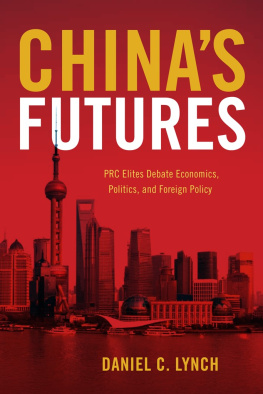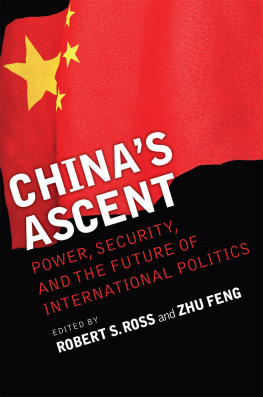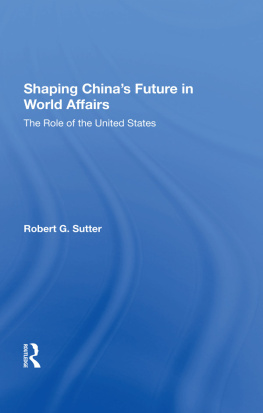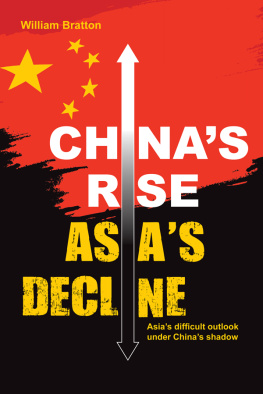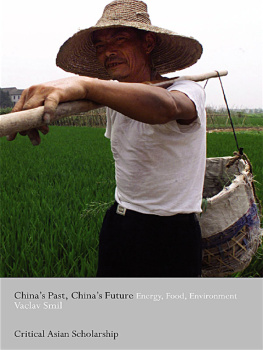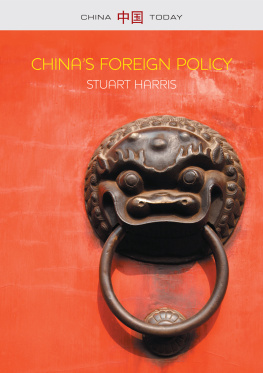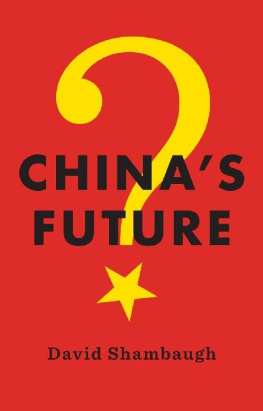Stanford University Press
Stanford, California
2015 by the Board of Trustees of the Leland Stanford Junior
University. All rights reserved.
No part of this book may be reproduced or transmitted in any form or by any means, electronic or mechanical, including photocopying and recording, or in any information storage or retrieval system without the prior written permission of Stanford University Press.
Special discounts for bulk quantities of Stanford Business Books are available to corporations, professional associations, and other organizations. For details and discount information, contact the special sales department of Stanford University Press.
Tel: (650) 736-1782, Fax: (650) 736-1784
Printed in the United States of America on acid-free, archival-quality paper
Library of Congress Cataloging-in-Publication Data
Lynch, Daniel C. (Daniel Christopher), author.
Chinas futures : PRC Elites Debate Economics, Politics, and Foreign Policy / Daniel C. Lynch.
pages cm
Includes bibliographical references and index.
ISBN 978-0-8047-9257-8 (cloth : alk. paper)
ISBN 978-0-8047-9419-0 (pbk. : alk. paper)
1. ChinaPolitics and government2002Public opinion. 2. ChinaForeign relations21st centuryPublic opinion. 3. ChinaEconomic conditions2000Public opinion. 4. ChinaSocial conditions2000Public opinion. 5. Elite (Social sciences)ChinaAttitudes. 6. Public opinionChina. 7. ChinaForecasting. I. Title.
DS779.4.L96 2015
951.06dc23
2014033657
ISBN 978-0-8047-9437-4 (electronic)
Typeset by Thompson Type in 10/15 Sabon
Preface: Competing Chinese Conceptions of the PRCs Possible Futures
A MARCH 24, 2014, GOOGLE SEARCH uncovered nearly 13 million Internet pages addressing some aspect of the rise of China. In the twenty years since William H. Overholt first published his prophetic book with that title, If democratization is inevitable or at least highly likely, why should anyone be concerned that a successful Chinese rise might lead to the power transition becoming acrimonious or even violent? Or, from an entirely different angle, is it not possible that democratization would be more likely to occur in the event Chinas massively complex mix of economic, environmental, and demographic challengesunprecedented for any country in modern historywere to cause the rise to stall?
All of these questions (and more) are at the forefront of contemporary debate among political and other social scientists, international relations scholars, policy analysts and government officials, journalists, business people, NGO professionals, and everyday concerned citizens. Chinas stunning economic successes invite intense and widespread rumination that no matter how scientific a predictioneers model may appear to be, the future can never be known, because (1) there are too many factors in play that will affect it, and (2) even if the factors could be mapped and measured, human agency (free willcritical though circumscribed), along with chance events, will always intervene to make predicting with reliable accuracy impossible.
On the other hand, it would be foolish and irresponsible to abandon all efforts at thinking systematically about what the future may bringor, in our case, which of several plausible, but competing, developmental trajectories China might take in the specific subarenas of the economy, politics, public culture, and foreign policy. As elaborated in most probable is, obviously, not the same as analyzing the future itself, which, by definition, is impossiblebecause nothing in the future has happened yet.
To date, very few of the observers struggling to get a handle on Chinas developmental course have devoted their energies to analyzing systematically the varying images of the future circulating within China itself; that is, the discussions and debates concerning Chinas possible trajectories that the PRCs huge cadre of smart, well-informed, hard-working, and public-minded policy analysts (whether in academia, think tanks, government, or business) engage in every day. In any country, images of the futureor competing conceptualizations of the national trajectory as manifest in economics, politics, culture, foreign policy, and other issue-areashelp to shape real-world policy making (and private sector decision making) in the present and consequently the trajectory itself. Especially in a still superauthoritarian country like China, images articulated by elites (broadly conceived) are likely to be highly valuableeven though so far underexploitedwindows on what the future might hold. Researchers can study these images in an effort to understand different possible trajectories even if the analysts who circulate them are acting within the boundaries of broad Party guidelines. This is because of the near-certainty that the authoritarian power center will exert the dominant influence over which of several different paths China ends up taking. So whether intellectual (or other) elites affect the leaders thinking, or, in contrast, the leaders shape the elites research and assessment agendas, either way, the images elites circulate can serve as a mirror on the policy choices the power center is most likely to face.
Elite images are obviously not the only important factor shaping a countrys developmental trajectory. Material factors related to geography, demography, the economy, and the environment are also critically important, along with exogenous factors originating in foreign countries or global society. But this book assumes that what high-profile figures within the Chinese establishment think and say about their countrys developmental trajectory, along with their recommendations for how the trajectory should be altered to achieve a more desirable future, can be The critical point is that even when Chinese analysts are simply reflecting the demands of the Party Center in the images of the future they create and circulate, studying these imageshow they reflect what is expected and what (possibly in contrast) would be normatively desirablecan be highly useful in trying to assess what the trajectory is likely to become, precisely because the elites are operating inside parameters imposed by the (still) awesomely powerful Party-state.
Each of and briefly addressing more recent developments such as the pledges made concerning economic reform at the CCPs Third Plenum in November 2013 and the near-simultaneous declaration of an Air Defense Identification Zone over most of the East China Sea. For this is the central tension in the Chinese images uncovered in this research: Some elites, especially economists, view Chinas rise as perched precariously on the edge of a devastating crisis, which would center on a sharp slowdown in economic growth even if complex, risky, and divisive reforms are implemented; whereas others, especially international relations specialists (though not all of them), express a heedless hubris that nothing could stop Chinas rise; therefore, the time has come to assert Chinas CCP-defined national interests much more boldly and vigorously than at any point since at least the mid-1990s. These two groups do not even seem to talk to each other, though the economists are far more aware of (and worried about) the brashness of the IR specialists than the other way around. Through systematic reading and interviews, one arrives at the inescapable conclusion that most IR scholars do not even bother to concern themselves with what the economists are writing, even though the economists warnings of inevitable trouble strike at the core of the nationalist IR specialists boundless optimism, which fuels or reinforces risky policy choices. This central tension and its implications will become evident in the chapters to follow.

